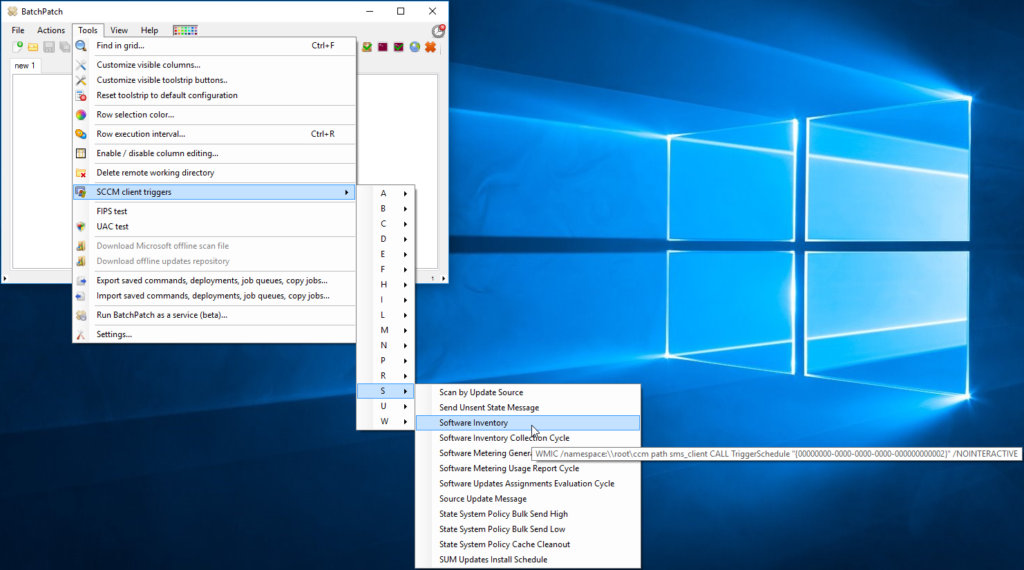As a convenience for those of you are using SCCM in your environment, last year we added the ability to trigger SCCM client actions remotely, directly from BatchPatch. We’ve received a few questions about this topic recently, so I figured I would take a few minutes to provide some context here.
SCCM administrators sometimes need or want to initiate a certain activity on client computers at non-scheduled times. For example, maybe you need your clients to perform a ‘Software Inventory,’ and you would like to execute that action on-demand. You could certainly establish a remote connection to all of the computers in question, and then you could execute a command line task to trigger the desired process. Or you could fire up PsExec from your workstation, and then use it to remotely trigger the process on a set of target computers. However, if you are a BatchPatch user, you can initiate the process directly from BatchPatch in a single click. BatchPatch isn’t doing any special magic here. We’re simply making it quicker/easier for you to remotely trigger SCCM client actions without having to mess with any command line copy/paste.
The list of SCCM triggers available in BatchPatch are:
{00000000-0000-0000-0000-000000000001} Hardware Inventory
{00000000-0000-0000-0000-000000000002} Software Inventory
{00000000-0000-0000-0000-000000000003} Discovery Inventory
{00000000-0000-0000-0000-000000000010} File Collection
{00000000-0000-0000-0000-000000000011} IDMIF Collection
{00000000-0000-0000-0000-000000000012} Client Machine Authentication
{00000000-0000-0000-0000-000000000021} Request Machine Assignments
{00000000-0000-0000-0000-000000000022} Evaluate Machine Policies
{00000000-0000-0000-0000-000000000023} Refresh Default MP Task
{00000000-0000-0000-0000-000000000024} LS (Location Service) Refresh Locations Task
{00000000-0000-0000-0000-000000000025} LS (Location Service) Timeout Refresh Task
{00000000-0000-0000-0000-000000000026} Policy Agent Request Assignment (User)
{00000000-0000-0000-0000-000000000027} Policy Agent Evaluate Assignment (User)
{00000000-0000-0000-0000-000000000031} Software Metering Generating Usage Report
{00000000-0000-0000-0000-000000000032} Source Update Message
{00000000-0000-0000-0000-000000000037} Clearing proxy settings cache
{00000000-0000-0000-0000-000000000040} Machine Policy Agent Cleanup
{00000000-0000-0000-0000-000000000041} User Policy Agent Cleanup
{00000000-0000-0000-0000-000000000042} Policy Agent Validate Machine Policy / Assignment
{00000000-0000-0000-0000-000000000043} Policy Agent Validate User Policy / Assignment
{00000000-0000-0000-0000-000000000051} Retrying/Refreshing certificates in AD on MP
{00000000-0000-0000-0000-000000000061} Peer DP Status reporting
{00000000-0000-0000-0000-000000000062} Peer DP Pending package check schedule
{00000000-0000-0000-0000-000000000063} SUM Updates install schedule
{00000000-0000-0000-0000-000000000071} NAP action
{00000000-0000-0000-0000-000000000101} Hardware Inventory Collection Cycle
{00000000-0000-0000-0000-000000000102} Software Inventory Collection Cycle
{00000000-0000-0000-0000-000000000103} Discovery Data Collection Cycle
{00000000-0000-0000-0000-000000000104} File Collection Cycle
{00000000-0000-0000-0000-000000000105} IDMIF Collection Cycle
{00000000-0000-0000-0000-000000000106} Software Metering Usage Report Cycle
{00000000-0000-0000-0000-000000000107} Windows Installer Source List Update Cycle
{00000000-0000-0000-0000-000000000108} Software Updates Assignments Evaluation Cycle
{00000000-0000-0000-0000-000000000109} Branch Distribution Point Maintenance Task
{00000000-0000-0000-0000-000000000110} DCM policy
{00000000-0000-0000-0000-000000000111} Send Unsent State Message
{00000000-0000-0000-0000-000000000112} State System policy cache cleanout
{00000000-0000-0000-0000-000000000113} Scan by Update Source
{00000000-0000-0000-0000-000000000114} Update Store Policy
{00000000-0000-0000-0000-000000000115} State system policy bulk send high
{00000000-0000-0000-0000-000000000116} State system policy bulk send low
{00000000-0000-0000-0000-000000000120} AMT Status Check Policy
{00000000-0000-0000-0000-000000000121} Application manager policy action
{00000000-0000-0000-0000-000000000122} Application manager user policy action
{00000000-0000-0000-0000-000000000123} Application manager global evaluation action
{00000000-0000-0000-0000-000000000131} Power management start summarizer
{00000000-0000-0000-0000-000000000221} Endpoint deployment reevaluate
{00000000-0000-0000-0000-000000000222} Endpoint AM policy reevaluate
{00000000-0000-0000-0000-000000000223} External event detection |
In BatchPatch you can see all of the triggers listed alphabetically under ‘Tools > SCCM client triggers.’
To execute a particular task, simply highlight the desired target computers in the grid, then select ‘Tools > SCCM client triggers’ and choose the desired task. In the screenshot below you can see that when I hover over a particular task, it shows the actual command that will be executed on the target host.


